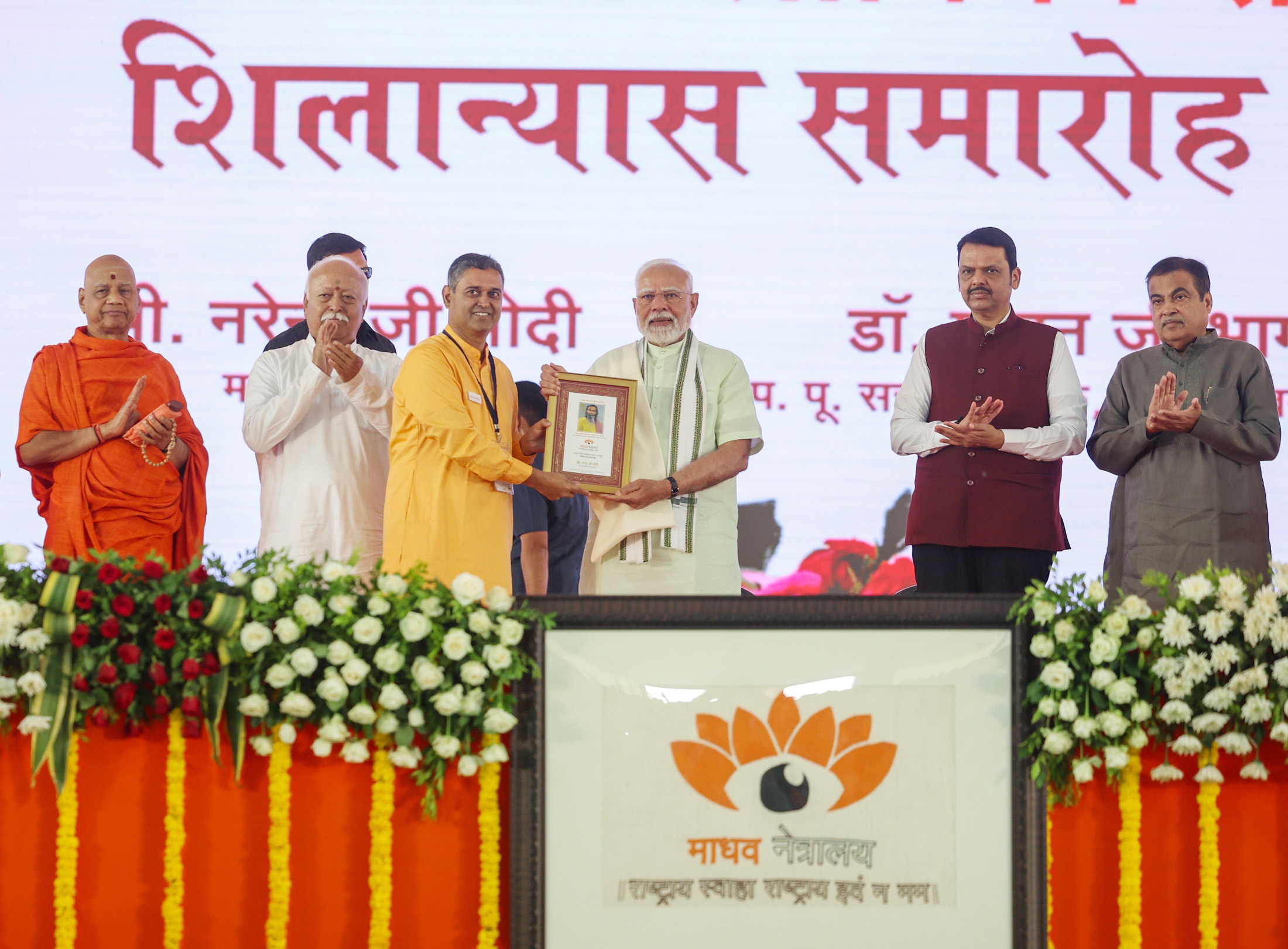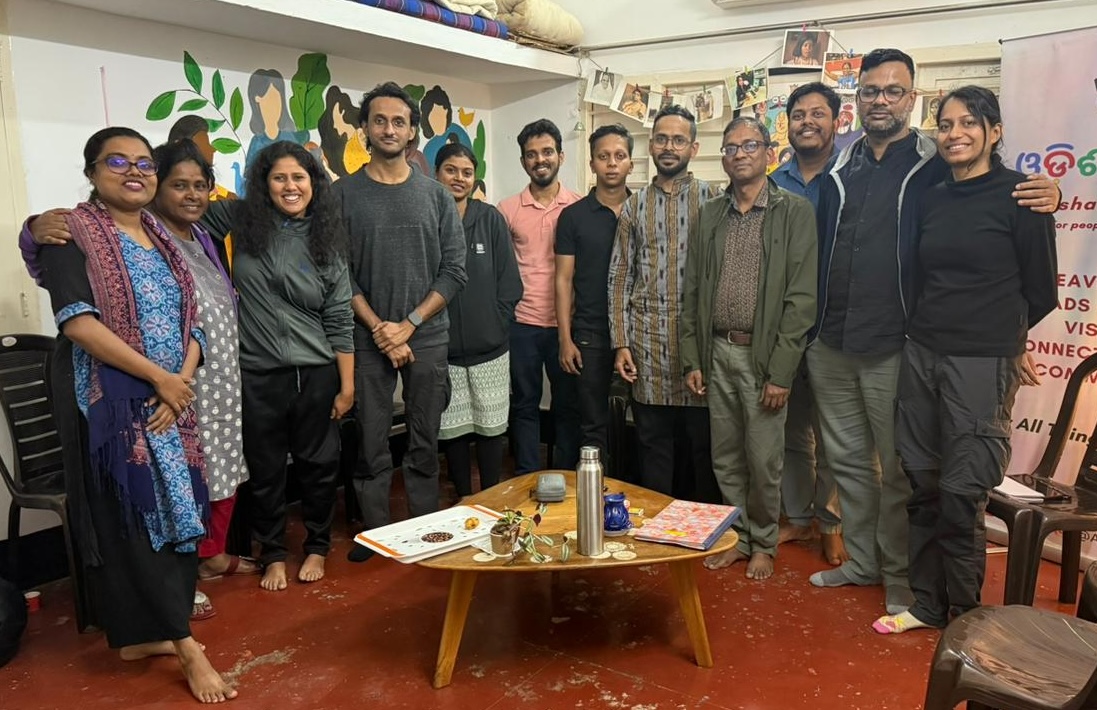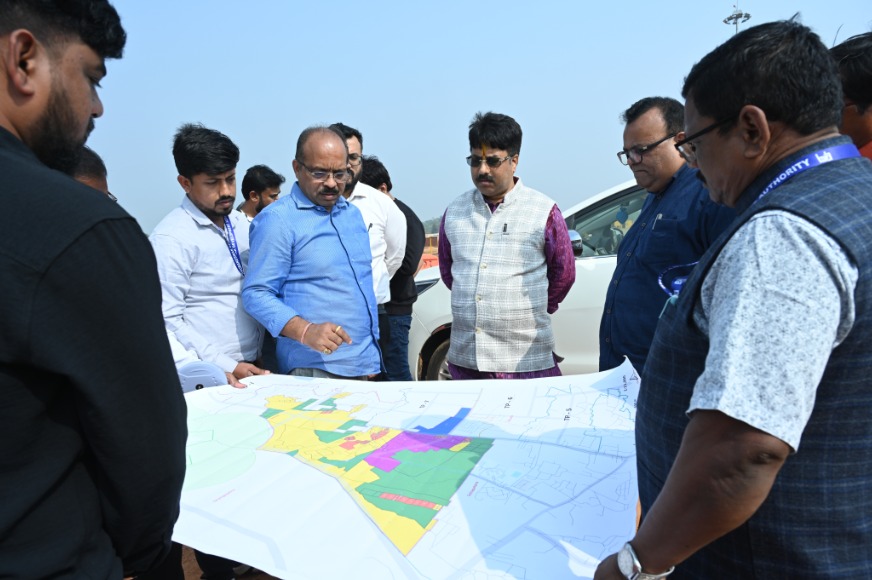Nagpur: Prime Minister Narendra Modi laid the foundation stone of the Madhav Netralaya Premium Centre in Nagpur, Maharashtra, today. Addressing the gathering, he underscored the significance of Chaitra Shukla Pratipada, which marks the beginning of the sacred Navratri festival. He highlighted the nationwide celebrations of festivals such as Gudi Padwa, Ugadi, and Navreh, while also commemorating the birth anniversaries of Bhagwan Jhulelal and Guru Angad Dev. The occasion, he noted, coincides with the birth anniversary of the inspirational Dr. K.B. Hedgewar and the centenary year of the Rashtriya Swayamsevak Sangh (RSS). He expressed his honor in visiting the Smruti Mandir to pay homage to Dr. Hedgewar and Shri Golwalkar Guruji on this historic day.
Highlighting the 75th anniversary of the Indian Constitution and the upcoming birth anniversary of Dr. Babasaheb Ambedkar, Modi spoke about paying homage at Deekshabhoomi, seeking blessings for the nation’s progress. He extended greetings to citizens on Navratri and other festivals being celebrated across the country.
Emphasizing Nagpur’s reputation as a sacred center of service, the Prime Minister praised the Madhav Netralaya anthem, which reflects spirituality, knowledge, pride, and humanity. He lauded the institution for serving millions over decades and restoring light to countless lives. With the new campus of Madhav Netralaya, he expressed confidence that its expansion would further accelerate service activities, bringing vision and hope to thousands.
Reiterating his emphasis on ‘Sabke Prayas’ from the Red Fort, Modi highlighted the significant strides made in the healthcare sector. He noted that Madhav Netralaya complements government efforts by ensuring quality healthcare access. “Our priority is to ensure better healthcare for all citizens, especially the poorest,” he asserted. He emphasized that no citizen should be deprived of medical dignity, particularly senior citizens who have contributed to the nation. Citing the success of Ayushman Bharat, he noted that millions have received free medical treatment, while Jan Aushadhi Kendras provide affordable medicines, saving citizens thousands of crores. He highlighted the establishment of lakhs of Ayushman Arogya Mandirs in villages, enabling primary healthcare through telemedicine and reducing the need for long-distance travel for medical tests.
Modi emphasized the government’s commitment to medical education, noting that the number of medical colleges has doubled and the number of AIIMS institutions has tripled. The number of medical seats has also doubled, ensuring more skilled doctors for the future. He highlighted initiatives to allow students to study medicine in regional languages, making medical education more inclusive. Alongside advancements in modern medical science, India is also promoting its traditional knowledge. He remarked that yoga and Ayurveda have achieved global recognition, enhancing India’s prestige on the world stage.
Discussing India’s cultural consciousness, the Prime Minister spoke about centuries of invasions and colonialism that sought to dismantle India’s social structure. Despite these challenges, he emphasized that India’s spiritual and cultural identity remained resilient. He credited Bhakti movement saints like Guru Nanak Dev, Kabir Das, Tulsidas, Surdas, and Maharashtra’s Sant Tukaram, Sant Eknath, Sant Namdev, and Sant Dnyaneshwar for awakening India’s national consciousness. He also praised Swami Vivekananda for reigniting India’s self-confidence. He underscored the role of Dr. Hedgewar and Guruji in energizing this national consciousness in the final decades of colonial rule. He likened RSS to the Akshay Vat, a sacred, indestructible tree continuously energizing India’s culture and national consciousness.
Modi connected vision and direction, quoting the Vedic aspiration, “Pashyema Sharadah Shatam”—”May we see for a hundred years.” He recalled Shri Gulabrao Maharaj, a blind saint from Vidarbha, who, despite losing eyesight, wrote extensively. He emphasized that true vision comes from wisdom and discernment, a principle embodied by both Madhav Netralaya and the RSS.
He described service and altruism as the essence of life, quoting scriptures that define service as devotion. He noted that RSS volunteers dedicate themselves tirelessly to selfless service, whether in tribal education, disaster relief, or healthcare initiatives like Netra Kumbh during Prayag Mahakumbh. He emphasized the disciplined response of RSS volunteers in times of crisis, citing their exemplary work during floods, earthquakes, and pandemics.
Sharing an anecdote about Guruji, Modi recounted how he described the RSS as light, which dispels darkness and shows the way forward. He urged everyone to embrace the principles of selflessness and national service, emphasizing that India’s progress is visible because of a collective shift from colonial mindset to national pride. He cited the replacement of outdated British laws with Bharatiya Nyay Sanhita, the transformation of Rajpath into Kartavya Path, and the redesign of the Indian Navy flag to reflect Chhatrapati Shivaji Maharaj’s legacy. He also mentioned renaming Andaman islands to honor India’s freedom fighters.
Discussing India’s global contributions, Modi highlighted the nation’s leadership in humanitarian efforts, citing COVID-19 vaccine diplomacy, disaster relief missions like Operation Brahma, and aid to Türkiye, Nepal, and the Maldives. He credited India’s rising global stature to its youth, who are excelling in innovation, startups, and nation-building efforts. He expressed confidence that India’s youth will lead the country toward the vision of ‘Viksit Bharat 2047’.
Reflecting on the RSS’s 100-year journey, Modi contrasted its establishment in 1925—a time of colonial struggle—with today’s aspirational India. He recalled Guruji’s words, expressing the desire to be a small stone in the foundation of a grand national edifice. He urged continued dedication to nation-building, emphasizing that India’s actions today will shape its next 1,000 years.





